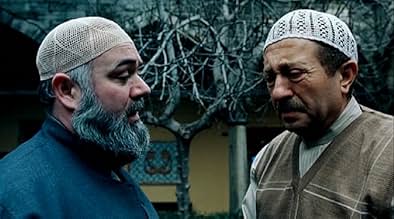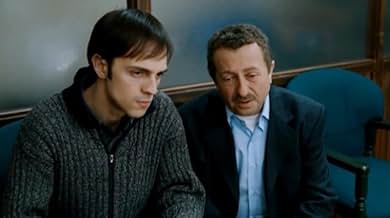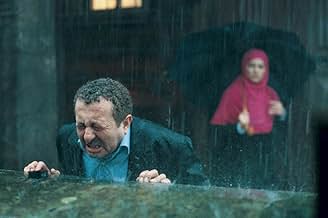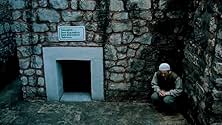A promotion brings a Muslim's relationship with God into question.A promotion brings a Muslim's relationship with God into question.A promotion brings a Muslim's relationship with God into question.
- Awards
- 19 wins & 15 nominations total
- Director
- Writer
- All cast & crew
- Production, box office & more at IMDbPro
7.414.4K
1
2
3
4
5
6
7
8
9
10
Featured reviews
Good ethical-drama-cum-quasi-documentary
Takva attempts to achieve two things; It is a philosophical drama, and also a quasi-documentary. Putting the main character in a low-profile religious order, and in a ethical conundrum, the movie makers hit two birds with one reel.
Religious orders and their role in the growing politicization of Islam in Turkey is a sensitive subject. The movie refrains from saying much politically, or the characters do not have lines that can be interpreted in such a manner. However, 'Takva the documentary' speaks volumes.
Takva has good actors such as Erkan Can (the lead), a straightforward but engaging story, and a lot to learn from.
Religious orders and their role in the growing politicization of Islam in Turkey is a sensitive subject. The movie refrains from saying much politically, or the characters do not have lines that can be interpreted in such a manner. However, 'Takva the documentary' speaks volumes.
Takva has good actors such as Erkan Can (the lead), a straightforward but engaging story, and a lot to learn from.
cinema with guts, heart & soul
Saw Takva last night at The Sydney Film Festival 2007, utterly compelling, driven by Erkan Can's fine performance as Muharrem, a devout Muslim in contemporary Istanbul. Previous posts outline more.
I was fascinated by the way Takva engages with contemporary Turkey, a notionally democratic and secular society since the 1920s. Yes, Muharrem has an existential crisis, also familiar to audiences of Shrek 3 in another way ... dare I mention it, by profane comparison.
I suspect Takva has a satirical streak, once you imagine the dervishs's lodge could be the current government of Turkey.
Am I right? Responses from Turkish members most welcome.
I was fascinated by the way Takva engages with contemporary Turkey, a notionally democratic and secular society since the 1920s. Yes, Muharrem has an existential crisis, also familiar to audiences of Shrek 3 in another way ... dare I mention it, by profane comparison.
I suspect Takva has a satirical streak, once you imagine the dervishs's lodge could be the current government of Turkey.
Am I right? Responses from Turkish members most welcome.
to avoid of sin because of the fear of god
It's a good movie to get know a profile of the religious Muslims, to get know "sects" and the amazing, fascinating worship of them. To find answers to the questions like; "how does a sect process and what's happening inside of a sect?". But it doesn't give a political message, a movie that "sit on the fence". But I congratulate the director for at least his bravery to submit these kind of sources and to try to answer some questions or to ask some questions. The main actor Erkan Can has a great performance.
Besides the musics that are made by Replicas, (Gokce Akcelik) are great. Enjoy...
Besides the musics that are made by Replicas, (Gokce Akcelik) are great. Enjoy...
fear that becomes a disaster
the movie and it's consistency with,the reality of such kind of religion originated community, is marvelous since you feel familiar most of the stages with the man you recognize which is rigidly religious.It is rare and very difficult to create such kind of complicated film especially for a director which had directed only moderate TV series in Turkey.He surpassed the expectation thanks to his talent and observation.Besides director, the casting and performance of the actors is impressive since they really overcame the difficulty of the performing the characters who are rare in community and which differs from society by small details.The way pilot flows is satisfactory but on the other hand,the simplicity of some parts of the movie, especially in final minutes,does not meet the expectation of the audience which expects the ultimate end.The issue director criticize is imagined untouchable for the conservative parts of society.according to me we should congratulate the courageous and objective view of director.it is a good film for whom are open minded and opposing.
The gripping story of a devout man who looses his mind over the pragmatic power games of an Islamic brotherhood he adheres to.
Takva - A Man's Fear of God is one of those films that playfully enact conflicts of fundamental importance for the world we live in. Takva starts off with humble Muharrem, an introverted single man living in Istanbul, being drawn into the inner circle of a Muslim brotherhood he has adhered to ever since his childhood days. When the erudite and strikingly pragmatic leader, Sheikh Cemal, appoints him as his financial organizer, Muharrem gets endowed with all the amenities and trappings of a modern world businessman. He has to collect rent and administer the order's finances. His naive will to live a life according to what he thinks is the will of God clashes not only with his unfulfilled sexual desires, but also with the mechanisms of power within the order. The brothers' lifestyle may be conservative, but they run an organization that is fully intertwined with the present day social, political and economic life of Turkey.
For Muharrem, who hardly understands any of this business, this means that every step he intends to make for the greater glory of God draws him ever deeper into the quagmire of corruption, lies and hypocrisy. The authority he is endowed with now makes him haughty and difficult to deal with, while his accumulated frustration increasingly throws him into literal fits. Everything escalates when he comes face to face with the woman he desires...
The plot for this great film is based on an old folk tale from Turkey about a man who refuses to marry the daughter of his spiritual master although he clearly loves her. In Onder Cakar and Omer Kiziltan's adaptation, the narrative serves to expose the inner mechanisms of puritan Muslim orders and throw light on the mental set-up of its loyal members. The film is pure fun to watch due to countless instances of great irony, a remarkable love for detail and breathtaking scenes of ecstatic rituals. While the filmmakers were very careful not to ridicule the milieu they're depicting, their critical approach accounts for a film that substantially helps understand the way political Islam "works".
For Muharrem, who hardly understands any of this business, this means that every step he intends to make for the greater glory of God draws him ever deeper into the quagmire of corruption, lies and hypocrisy. The authority he is endowed with now makes him haughty and difficult to deal with, while his accumulated frustration increasingly throws him into literal fits. Everything escalates when he comes face to face with the woman he desires...
The plot for this great film is based on an old folk tale from Turkey about a man who refuses to marry the daughter of his spiritual master although he clearly loves her. In Onder Cakar and Omer Kiziltan's adaptation, the narrative serves to expose the inner mechanisms of puritan Muslim orders and throw light on the mental set-up of its loyal members. The film is pure fun to watch due to countless instances of great irony, a remarkable love for detail and breathtaking scenes of ecstatic rituals. While the filmmakers were very careful not to ridicule the milieu they're depicting, their critical approach accounts for a film that substantially helps understand the way political Islam "works".
Did you know
- TriviaTurkey's Official Submission to the Best Foreign Language Film Category of the 80th Annual Academy Awards (2008).
- How long is Takva: A Man's Fear of God?Powered by Alexa
Details
Box office
- Gross worldwide
- $2,040,826
- Runtime
- 1h 36m(96 min)
- Color
- Sound mix
- Aspect ratio
- 1.85 : 1
Contribute to this page
Suggest an edit or add missing content


























